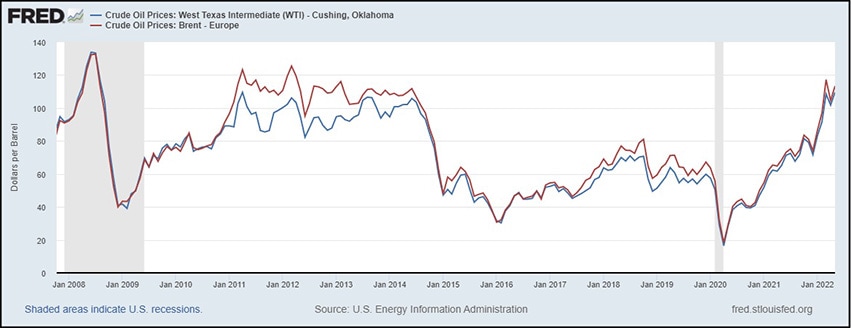
Welcome back to Peoria Magazine’s Econ Corner, a recurring feature in which we pose questions to experts about various economic issues and how they affect our lives and careers here in central Illinois. Dr. Joshua Lewer, Chairman of the Department of Economics and McCord Professor of Executive Management Development at Bradley University, returns to provide this month’s analysis.
Peoria Magazine (PM): The price of a gallon of gasoline has topped $5 in central Illinois, no small factor in fueling inflation that is putting a real hurt on many Americans. Not uncommonly, citizens blame the federal government for contributing to the problems at the pump — and elsewhere — or look to that same government to fix them. But oil is traded on global markets, and fuel prices are up just as much if not more in Europe.
Are there actions the federal government could take that would have a measurable, positive impact on fuel prices?
Dr. Lewer (DL): Oil is an interesting commodity to follow with respect to price action. While it is true that the price of oil is determined by global forces of supply and demand, one thing that most people do not know is that Americans still pay a discount for their oil compared to the rest of the world.
Take a look at the figure on page 89 from the Federal Reserve. Ever since 2009 when the fracking revolution added significant production and capacity here in the United States, West Texas Intermediate (the price the U.S. pays for oil) diverged from Brent (the price Europe and the world pays for oil). This discount continues today as WTI prices are about 2% lower than Brent.
With national gas prices topping $5 per gallon, everyone wants to know: What can be done about today’s elevated energy prices? In the short run, the answer is to encourage, not discourage, conventional oil and gas production.
Elon Musk recently tweeted, “Hate to say it, but we need to increase oil & gas production immediately.” U.S. oil production is down from 13 million barrels per day in 2019 to roughly 11.6 million barrels per day today. There’s a lot of reasons for the decline including COVID-19 disruptions and the Biden administration’s anti-oil and gas policies (e.g. pipeline cancellations, restrictions on new oil and gas permits on public lands and waters, federal SEC proposal mandating public companies disclose climate-related risks, thereby reducing financial flows to the industry, etc.).
We all want to move toward a renewable energy future that protects our environment, but it will take time. As the seminal oil analyst David Yergen said, “People always underestimate the impact of technology.” The transition to sustainable energy will happen, and America has already reached peak oil demand, but let’s not stifle domestic oil and gas production in the meantime.

PM: There has been a fair amount of conversation, of late, regarding “greedflation” — the idea that inflation is worse than it should be because opportunistic corporations are engaging in price gouging. Do you think there’s anything to that, or is this merely a supply-and-demand situation? If it’s the former, are there legitimate remedies for it?
DL: For the most part, I disagree with the “greedflation” narrative. This is an inflation story, not a greed story.
The U.S. Commerce Department report of May 26 indicated that corporate profits decreased in the first quarter of 2022 by 2.3% as inflation and supply chain disruptions caused costs to significantly increase across the board. While it is true that businesses are for the most part passing along these higher costs to consumers to protect their margins, they are also struggling with other inflationary pressures of their own including paying higher wages, hiring/retaining talent, and work location adjustments.
For example, the Bureau of Labor Statistics’ most recent jobs report indicated that average hourly earnings increased from $30.36 in May 2021 to $31.95 in May 2022, a 5.2% increase. Weighted prices would need to adjust by more than 5.2% to account for these wage pressures.
As Eliyahu M. Goldratt suggested in his book Theory of Constraints, the key to improving system performance is to unlock the main constraint or “bottleneck.” Inflation pressure is our most urgent bottleneck. Inflation is a tax and a silent thief that hurts the poor and middle class disproportionately. Trust me, a lot of pain will go away once this constraint has been removed.
PM: The Federal Reserve’s approach to rising inflation has been to raise interest rates to slow an overheated economy, but some have suggested that the federal government could move more aggressively on its own to curb the dramatic rise in the cost of living, everything from preemptive buying of food and fuel to price controls to wage subsidies for workers in professions where there are shortages.
Are there initiatives the government could implement that are more likely to help than hurt? Please elaborate.
DL: : This is a difficult question because most federal policy tools are blunt. For example, the Federal Reserve can raise interest rates to dampen aggregate consumption and investment, thereby slowing the economy and inflation. But, monetary policies from the Federal Reserve can’t fix broken supply chains, end C19 lockdowns in China, or stop the Russia-Ukraine war. Wage and price controls of the past haven’t worked either.
I’m afraid to say it, but the single most important thing that needs to happen now is for the Federal Reserve to restore its credibility with respect to price stability. Inflation expectations are beginning to become unanchored. For example, the University of Michigan’s Survey of Consumers from May 2022 shows that the median expected year-ahead inflation rate was 5.4%, up from 4.6% last year.
Quantitative tightening is in our future.




